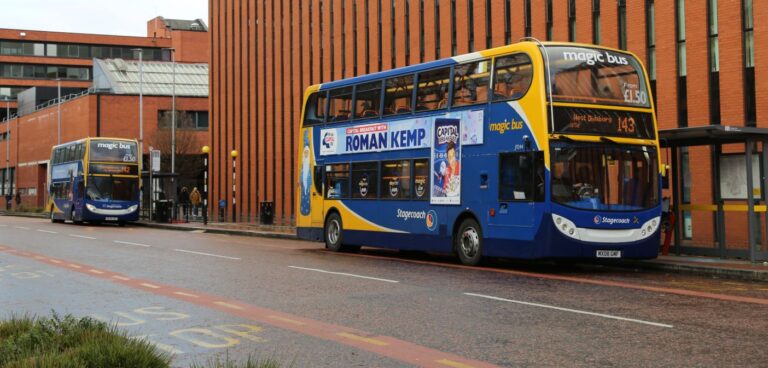More than 30 counties, city regions and unitary authorities across England have been chosen for £1.2bn in funding to level up local bus services in the latest awards from the UK government’s bus transformation programme.
Including earlier awards, just under two-thirds of England’s population outside London stands to benefit from new investment to make their buses more frequent, more reliable, easier to understand and use, cheaper, or greener. Improvements will also include integrated ticketing and more bus lanes to speed up journeys.
According to the Department for Transport (DfT), 31 areas – 40% of all authorities that submitted Bus Service Improvement Plans (BSIPs) – have been chosen because of their ambition to repeat London’s approach to bus usage.
As stated in last year’s national bus strategy, Bus Back Better, areas not showing sufficient ambition, including for improvements to bus priority, would not be funded. In the meantime, a further £150m is being provided across England to maintain service levels as patronage continues to recover after the pandemic.
Areas among those set to receive funding to help deliver on their BSIP include Portsmouth, Stoke-on-Trent, Greater Manchester, West Yorkshire, West Midlands, Liverpool City Region, North East and North of Tyne Combined Authorities, Reading, Norfolk, Luton, York and Warrington.
UK transport secretary Grant Shapps said: “Buses are the most popular way of getting around in this country – but for too long people outside of London have had a raw deal. The investment we’re making today to ramp up the bus revolution will drive down fares at a time when people’s finances are tight and help connect communities across England.”
Mayoral combined authorities will also receive money for buses from the £5.7bn City Region Sustainable Transport Settlements (CRSTS), which have also been confirmed.
Improvements in the pilot area, Cornwall, will start next week, funded by £23.5m from the government. From 10 April, most bus fares in the county will be slashed, with short hop fares down by 20%, longer journeys costing up to 40% less and some bus passes cut by almost 50%.
Passes for unlimited bus travel across Cornwall will cost £5 per day (down from £9 now) or £20 per week. Town zones will cost £2.50 per day or £10 for a week, which, for commuters travelling five days a week, works out at £2 a day or £1 per journey.
All tickets will be available on all operators’ services and in the summer contactless tap-on and tap-off payments will be introduced and buses will connect with the main rail line at stations across the county.
The funding follows an announcement last week of £200m for almost 1,000 new electric or hydrogen buses, bringing the total funded in England under the government to 2,000. A further 600 green buses have been funded in Scotland, Wales and Northern Ireland from the block grant to the devolved administrations, reportedly putting the UK on target to meet its commitment of 4,000 zero-emission buses.
The government has also confirmed £5.7bn in funding to level up local bus, tram, rail, walking and cycling networks in England’s eight city regions. The CRSTS, first announced in the autumn statement, is designed to give the mayors of the country’s largest cities long-term certainty to plan and deliver transformational improvements to their local transport systems.
The money will help deliver, among other things, a new mass transit network in West Yorkshire, improvements to rail services in the Tees Valley, a flat fare on buses in Greater Manchester and bus rapid transit corridors in the West Midlands. Letters have been sent to the metro mayors outlining the funding.
These announcements, along with the funding of zero-emission buses and the bus elements of the increased CRSTS, form part of the £3bn for bus transformation announced in 2020. Around £2bn has also been paid to support bus and light rail services during the pandemic.
The government has also confirmed that tram and light rail operators across the Midlands and the North will also receive a share of over £37m of government support including Manchester (£20.5m), the North East Nexus (£7.3m), the West Midlands (£2.7m), Sheffield (£4m) and Nottingham (£3.3m).
The confirmed light rail recovery funding allocations come from the wider £150m package announced by the government to support bus and light rail services across the country.
Responding to today’s DfT funding announcement, chair of Urban Transport Group, Laura Shoaf, said: “Although we have yet to see the full details, today’s confirmation of substantial investment in Bus Service Improvement Plans, and in City Region Sustainable Transport Settlements, is welcome and will result in significant improvements in public transport and active travel provision for some of the people and places we serve.
“We now need to see this package of largely capital spending complemented by a long-term plan for revenue support for bus networks that can meet the national bus strategy’s aspirations for better services everywhere.”
However, Campaign for Better Transport said “the money awarded today falls woefully short” and warned that an estimated £10bn is needed by local authorities to improve bus services. Its response followed the publication of new research that found that 27% of bus services have been lost in the last 10 years.
“Today’s announcement means that the majority of local authorities that submitted bids were unsuccessful and will not receive funds to deliver bus service improvement plans, and even those that have received funding will not have received all the money they requested and will therefore have to cherry-pick which improvements they can deliver,” said Paul Tuohy, chief executive of Campaign for Better Transport.
The transport charity has now called on the government to tackle the buses crisis by redirecting a fifth of its £27bn road building budget into a single, long-term bus funding pot, giving a greater focus on revenue funding, and giving local authorities that missed out on today capability funding and support through a Bus Centre of Excellence.





